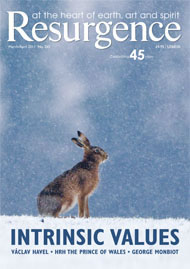Until about a quarter of a century ago, with few exceptions, most Christian Churches were absent from any mainstream ecological debate. Many ecologists, on the other hand, professed to belief in a God, a Universal Spirit, or a Grand Designer behind Creation, but did not subscribe to any formal religious faith. They either saw this as an irrelevance, or they held the Judaic-Christian tradition, in its various forms, as being responsible for many of today’s interrelated planetary crises.
It is only comparatively recently that some Christian leaders have joined forces with environmentalists to speak out with increasing urgency in defence of the Earth’s ecosystems and of future generations. An indisputable trigger has been the recognition that the Earth’s climate is changing rapidly, leading to unpredictable climatic disasters.
One early proponent of Christian ecological lifestyles is Edward Echlin, a Jesuit-trained theologian who, with his wife Barbara, was an early member of Christian Ecology Link (CEL). In Climate and Christ he links Jesus Christ’s teaching and itinerant ecological lifestyle with a blueprint for Christian action on climate change.
Jesus and his disciples inherited the Jewish agrarian tradition, leading a prophetic ‘alternative lifestyle’, treading lightly on the Earth and living mainly off the land, supplemented by fishing. The Gospels point to a fellowship of sharing and sufficiency, never taking more than was required.
Echlin admits that this particular itinerant life is impracticable in today’s society. However, if the principles of frugality, partial self-sufficiency and local sustainability could be adopted, not just by Christians but by individuals and communities from all faiths and walks of life, it would significantly contribute to mitigating the effects of climate change.
Writing in the aftermath of the UN Summit in Copenhagen in December 2009, where 102 leaders of participating countries failed to reach a binding agreement on the reduction of carbon emissions for fear of curtailing their competitive economic advantage, Echlin urges Christians now to take the lead.
The first part of the book describes what climate change is, the process of positive and negative feedback, and the imbalance of radiative forcing set in motion by our anthropogenic activities. Echlin challenges each of us not only to drastically reduce our own CO2 emissions to counter positive feedback, but to facilitate and even to be forces for negative feedback before a global tipping point is reached.
The second chapter points to the evolving contextual changes in our understanding of science as it develops and, in parallel, to the contextual evolution of theology. Humans are no longer considered as being the centre of God’s creation but as being a responsible part of it, and Christian theology must now integrate evolution. We are reminded that the words humus, humble and human are all derived from the same root.
Directly linking Jesus’ example and teaching with today’s messages and warnings about climate change may not always be easy when relying solely on the Gospel texts and contemporary commentaries. However, this is the underlying theme of the third part of the book.
The final chapter is an inclusive call to action by everyone. Cooperation needs to be global, led by faith and political leaders, and also local. No one should underestimate what can be achieved by individuals or by communities producing at least some of their own food, harvesting and conserving water and recycling raw materials.
Echlin’s own motivating gurus happen to be the recently beatified Cardinal John Henry Newman, the eminent French palaeontologist Pierre Teilhard de Chardin, and John Seymour, an erstwhile contributor to Resurgence.
The text is thoroughly researched, with a plethora of references to contemporary scientific and technical papers and report, but what I enjoyed most was the author’s own enthusiasm for the soil and its myriad fellow inhabitants, his delight in his own garden and its seasonal produce, and his many personal anecdotes. This book should send even urban able-bodied readers reaching for a communal spade and seeking out the nearest plot of uncultivated land.







